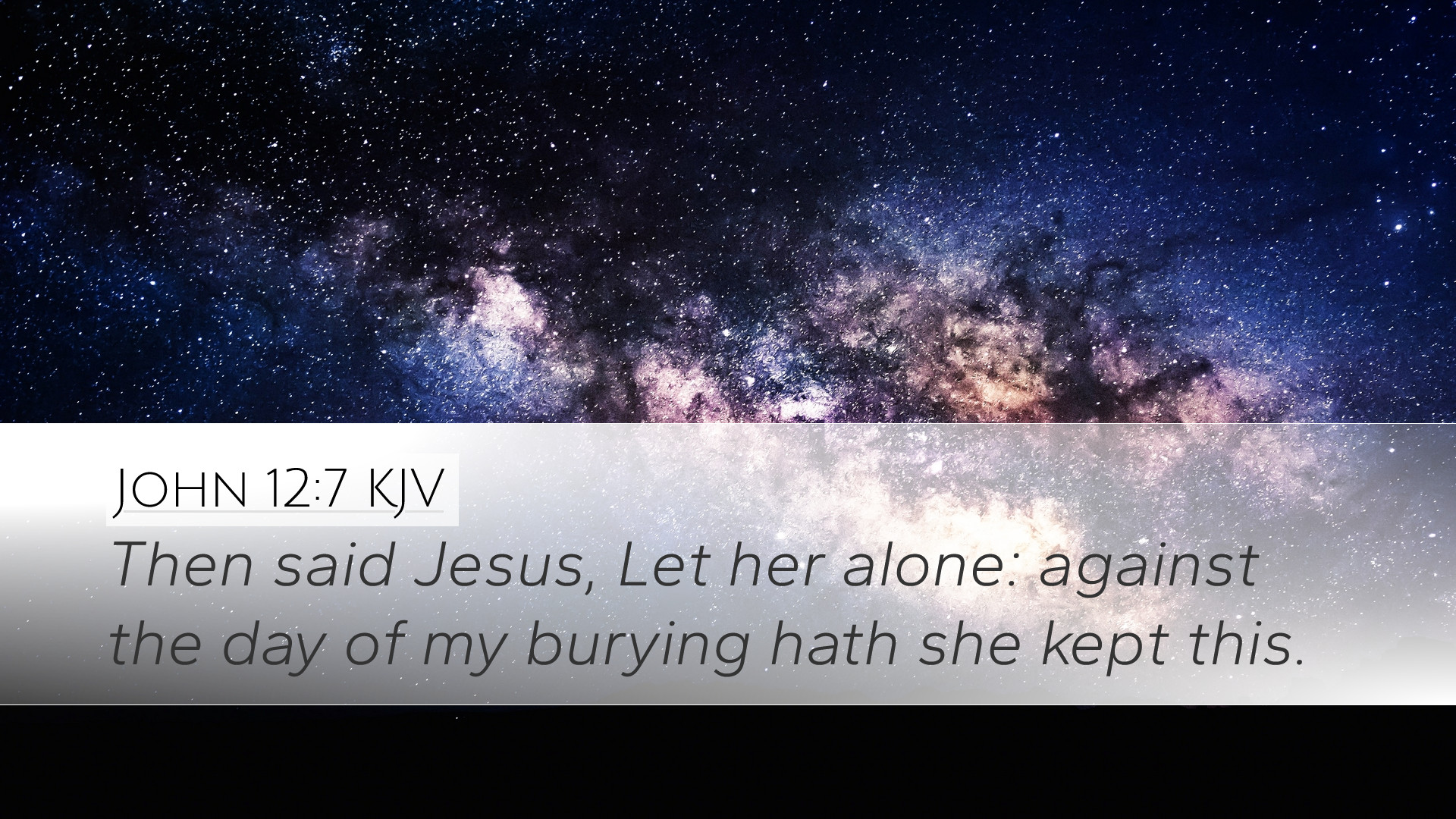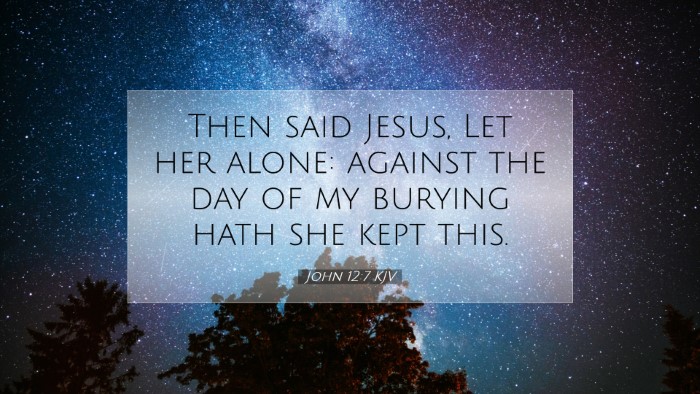John 12:7 Commentary
Verse Context: John 12:7 records a moment of profound significance just prior to the Passion of Christ. In this account, Jesus rebukes Judas Iscariot for criticizing Mary of Bethany’s act of anointing Him with costly perfume. This verse states: “Jesus said, ‘Let her alone; she has kept this for the day of My burial.’” This profound statement encompasses themes of worship, sacrifice, and the foreshadowing of Christ's death.
Historical and Cultural Background
The anointing of Jesus is situated within a cultural framework where anointing with oil was a sign of honor and love. Such acts expressed deep feelings and relationships in the ancient world, often explicitly linked to the preparations for death. This background further augments the significance of Mary’s actions in this oratory passage.
Commentary Insights
Matthew Henry's Commentary
Matthew Henry, the esteemed Puritan scholar, draws attention to Mary’s act as a token of her intense love for Christ. He emphasizes her recognition of the impending crucifixion and the honor shown by her sacrificial act of devotion. Henry also notes Judas' hypocrisy, as his criticism stems from selfish motives rather than genuine concern for the poor.
- Mary’s Recognition: Henry elucidates that Mary understood the significance of Jesus’ upcoming death and thus, anointed Him in anticipation of His burial.
- Jesus' Defense: In defending Mary, Christ showcases His acceptance of her gift as not merely an act of worship, but as an essential preparation for His death.
- Hypocrisy of Judas: Judas is depicted here as a figure representing false piety; he aims to take advantage of the situation for personal gain, in stark contrast to Mary’s pure-hearted devotion.
Albert Barnes' Notes
Albert Barnes elaborates on the nature of Jesus’ reproach of Judas. He affirms that Jesus does not negate the importance of caring for the poor; rather, He highlights the occasion's sacredness and the unique nature of Mary's act.
- The Value of the Anointment: Barnes points out that the expensive nature of the perfume being used is representative of the value placed on Christ. It underscores that true worship and honor for God is often costly.
- Significance of the Burial: Mentioning the ‘day of My burial’ indicates that Mary’s act is not lost on Jesus. It serves as a poignant acknowledgment of what is to come – His sacrifice on behalf of humanity.
- Redirecting Attention: Barnes emphasizes that Jesus redirects the disciples’ focus from material concerns to spiritual truths by reinforcing the importance of worship over the mundane.
Adam Clarke’s Commentary
Adam Clarke contributes a rich examination of the theological implications of this verse. He emphasizes the prophetic nature of Mary's act and its connection with Old Testament precedents for anointing.
- Prophetic Action: Clarke interprets Mary’s action as not merely spontaneous, but one that was preordained and prophetic — her anointing foreshadows the sacrificial death of Jesus.
- Response to Criticism: He considers Jesus’ response as an indication of His awareness of the larger narrative at play. Christ acknowledges Mary's gesture as fitting and necessary.
- Application to Discipleship: Clarke suggests this moment challenges the followers of Christ by illustrating the tension between earthly concerns and heavenly values. It calls believers to find a balance in worship amid life's demands.
Theological Reflections
The interplay between the actions of Mary and Jesus’ subsequent defense invites deeper theological reflection on the nature of worship. It raises critical questions regarding our priorities in faith: Are we willing to offer our best to Christ, even if it demands sacrifice?
The Nature of True Worship
True worship involves giving God our best, reflecting a heart that recognizes His worthiness. Mary’s act exemplifies this; it was not simply an act of pouring oil, but a deep-seated expression of love and recognition of who Jesus was — the Messiah. Such worship is unrestrained by societal norms, which appeals to those in pastoral ministries and theological studies to examine the authenticity of their own worship practices.
Caring for the Poor vs. Worship
Jesus’ response to Judas invites believers to reassess the balance between social concern and personal devotion. Is it possible that we may become so consumed by earthly responsibilities that we overlook the sacred moments in our walk with God? Christ's affirmation of Mary serves as a reminder to maintain a posture of worship amidst our duties.
Conclusion
John 12:7 offers a rich tapestry of insights into the nature of worship, sacrifice, and the heart of Jesus. As pastors, students, and theologians dig deeper into this passage, they are encouraged to reflect on their own worship practices, considering the depth of their love and devotion to Christ. The teachings of Henry, Barnes, and Clarke collectively invite a richer understanding of our response to Jesus’ sacrifice and the urgency of making our worship a priority.


